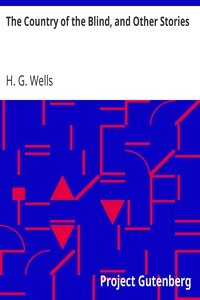The Country of the Blind, and Other Stories, H. G. Wells [top 10 books of all time TXT] 📗

- Author: H. G. Wells
Book online «The Country of the Blind, and Other Stories, H. G. Wells [top 10 books of all time TXT] 📗». Author H. G. Wells
And amidst the little population of that now isolated and forgotten valley the disease ran its course. The old became groping and purblind, the young saw but dimly, and the children that were born to them saw never at all. But life was very easy in that snow-rimmed basin, lost to all the world, with neither thorns nor briars, with no evil insects nor any beasts save the gentle breed of llamas they had lugged and thrust and followed up the beds of the shrunken rivers in the gorges up which they had come. The seeing had become purblind so gradually that they scarcely noted their loss. They guided the sightless youngsters hither and thither until they knew the whole Valley marvellously, and when at last sight died out among them the race lived on. They had even time to adapt themselves to the blind control of fire, which they made carefully in stoves of stone. They were a simple strain of people at the first, unlettered, only slightly touched with the Spanish civilisation, but with something of a tradition of the arts of old Peru and of its lost philosophy. Generation followed generation. They forgot many things; they devised many things. Their tradition of the greater world they came from became mythical in colour and uncertain. In all things save sight they were strong and able, and presently the chance of birth and heredity sent one who had an original mind and who could talk and persuade among them, and then afterwards another. These two passed, leaving their effects, and the little community grew in numbers and in understanding, and met and settled social and economic problems that arose. Generation followed generation. Generation followed generation. There came a time when a child was born who was fifteen generations from that ancestor who went out of the valley with a bar of silver to seek God's aid, and who never returned. Thereabouts it chanced that a man came into this community from the outer world. And this is the story of that man.
He was a mountaineer from the country near Quito, a man who had been down to the sea and had seen the world, a reader of books in an original way, an acute and enterprising man, and he was taken on by a party of Englishmen who had come out to Ecuador to climb mountains, to replace one of their three Swiss guides who had fallen ill. He climbed here and he climbed there, and then came the attempt on Parascotopetl, the Matterhorn of the Andes, in which he was lost to the outer world. The story of the accident has been written a dozen times. Pointer's narrative is the best. He tells how the little party worked their difficult and almost vertical way up to the very foot of the last and greatest precipice, and how they built a night shelter amidst the snow upon a little shelf of rock, and, with a touch of real dramatic power, how presently they found Nunez had gone from them. They shouted, and there was no reply; shouted and whistled, and for the rest of that night they slept no more.
As the morning broke they saw the traces of his fall. It seems impossible he could have uttered a sound. He had slipped eastward towards the unknown side of the mountain; far below he had struck a steep slope of snow, and ploughed his way down it in the midst of a snow avalanche. His track went straight to the edge of a frightful precipice, and beyond that everything was hidden. Far, far below, and hazy with distance, they could see trees rising out of a narrow, shut-in valley—the lost Country of the Blind. But they did not know it was the lost Country of the Blind, nor distinguish it in any way from any other narrow streak of upland valley. Unnerved by this disaster, they abandoned their attempt in the afternoon, and Pointer was called away to the war before he could make another attack. To this day Parascotopetl lifts an unconquered crest, and Pointer's shelter crumbles unvisited amidst the snows.
And the man who fell survived.
At the end of the slope he fell a thousand feet, and came down in the midst of a cloud of snow upon a snow slope even steeper than the one above. Down this he was whirled, stunned and insensible, but without a bone broken in his body; and then at last came to gentler slopes, and at last rolled out and lay still, buried amidst a softening heap of the white masses that had accompanied and saved him. He came to himself with a dim fancy that he was ill in bed; then realised his position with a mountaineer's intelligence, and worked himself loose and, after a rest or so, out until he saw the stars. He rested flat upon his chest for a space, wondering where he was and what had happened to him. He explored his limbs, and discovered that several of his buttons were gone and his coat turned over his head. His knife had gone from his pocket and his hat was lost, though he had tied it under his chin. He recalled that he had been looking for loose stones to raise his piece of the shelter wall. His ice-axe had disappeared.
He decided he must have fallen, and looked up to see, exaggerated by the ghastly light of the rising moon, the tremendous flight he had taken. For a while he lay, gazing blankly at that vast pale cliff towering above, rising moment by moment out of a subsiding tide of darkness. Its phantasmal, mysterious beauty held him for a space, and then he was seized with a paroxysm of sobbing laughter...
After a great interval of time he became aware that he was near the lower edge of the snow. Below, down what was now a moonlit and practicable slope, he saw the dark and broken appearance of rock-strewn turf. He struggled to his feet, aching in every joint and limb, got down painfully from the heaped loose snow about him, went downward until he was on the turf, and there dropped rather than lay beside a boulder, drank deep from the flask in his inner pocket, and instantly fell asleep...
He was awakened by the singing of birds in the trees far below.
He sat up and perceived he was on a





Comments (0)